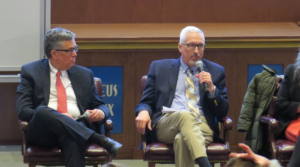Why You Should Care About Netwar

Image Courtesy of The Center for Aerospace and Security Studies
By Angela Hickey
As technology advances even further there were many who believed that advances in cybersecurity would help defend a battlefield that can be reached by all just with the touch of a button, the World Wide Web.
In the recent years that we’ve had the internet on a widely accessible basis, there’s no doubt that we have created boundless opportunities and have assisted in the creation of many modern marvels. But, with these positive advances come some negative side effects.
The act of cyber warfare, according to RAND Corporation, involves the actions by a nation-state or international organization to attack and attempt to damage another nation’s computers or information networks through, for example, computer viruses or denial-of-service attacks. “Netwar” on the other hand is a recently emerging consequence. The term refers to societal conflict and crime, short of war, in which the antagonists are organized more as sprawling “leaderless” networks than as tight-knit hierarchies. Many terrorists, criminals, fundamentalists, and ethno-nationalists are developing netwar capabilities.
This unsafe corner of the internet most likely reflects the unstable and rather volatile climate in the real world today.
“Given the current geopolitical situation, the Cybersecurity and Infrastructure Security Agency requests that all organizations significantly lower their threshold for reporting and sharing indications of malicious cyber activity,” said CISA, an organization within the Department of Homeland Security in an interview with Space News.
On a more severe note more recently, the U.S. government on March 17 advised satellite operators to put their guard up in the wake of a cyberattack that disrupted internet services in Europe provided by Viasat’s KA-SAT.
While this may seem like it has nothing to do with the average internet user, there are some serious long-term consequences that can severely affect how we as a society use the web.
Espionage, ransomware, and disinformation campaigns are just a few examples of how cyberwar and netwar can be used against the average citizen. In fact, 2021 saw a surge in ransomware attacks on businesses, and according to Unit 42, a security consulting team at Palo Alto Networks, the number of cyber extortion cases will likely grow in 2022. Also, in light of the recent pandemic and people working remotely, cyberwar tactics such as these have also led to an increase in cyber warfare, which is when a country is targeted with attacks leading to damage to the state or even loss of life.
Cyberwarfare is a more serious issue than people would like to believe; with cyber-related crimes on the rise, many people are at a loss as to how to protect their data. Information is key in situations like these. By remaining well informed on topics such as netwar and cyberwar, you are able to keep better control over your information and simultaneously help to prevent cyber warfare from causing disruption and chaos domestically.







